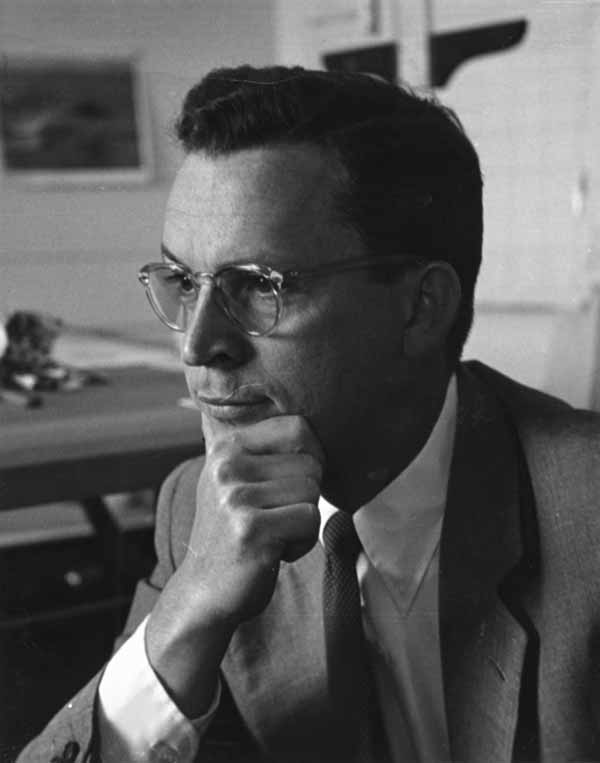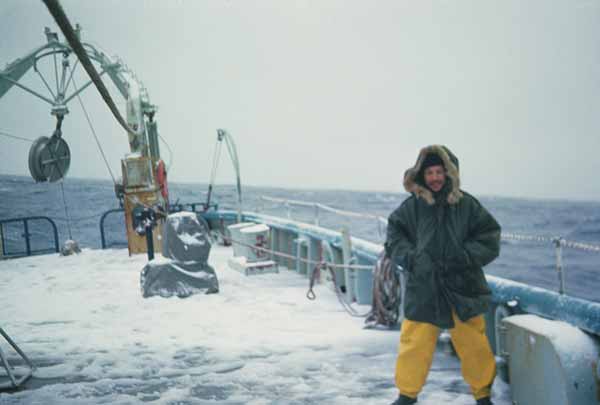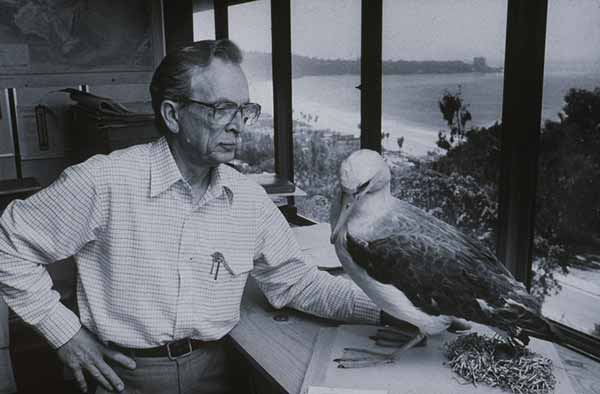Scientists Discover a New Signaling Pathway and Design a Novel Drug for Liver Fibrosis
Health & Behavior

Joe Reid
Joseph L. Reid, professor emeritus of physical oceanography in the Integrative Oceanography Division at Scripps Institution of Oceanography, UC San Diego, and renowned expert in ocean circulation, died of natural causes on April 2, 2015, at his home in Del Mar, Calif. He was 92.
Reid was a highly regarded physical oceanographer concerned with the study of large-scale ocean circulation from the California Current to the Pacific, Atlantic, and Indian oceans. He participated in and led many seagoing expeditions to learn more about the natural world.
He joined Scripps in 1948 and received an MS in physical oceanography in 1950. He spent the majority of his scientific career at Scripps and served as director of the Scripps Marine Life Research Group from 1974 to 1987.
During World War II, Reid served for more than two years in the U.S. Navy as second officer aboard USS Stockdale, a destroyer escort. He spent time in the Mediterranean and Caribbean seas and North Atlantic and Western Pacific oceans, often conducting wintertime convoy duty in the North Atlantic, considered by many to be one of the toughest Navy jobs during the war. After the war, he became interested in studying the oceans.
In 1955, he proposed and coordinated the NORPAC Expedition, which included 19 ships from the U.S., Japan, and Canada, and collected oceanographic measurements in the North Pacific Ocean. He has written numerous papers based on the expedition’s results and edited the NORPAC Atlas.
Aboard the Scripps research vessel Argo in 1966, he carried out a winter expedition into the northwestern Pacific, the Bering Sea, and the Okhotsk Sea. In 1968, he made the first measurements of the abyssal flow from the South Pacific into the North Pacific through its deepest passage, the Samoan Passage.

On the Piquero Expedition in 1969, he measured the transport of water from the Pacific to the Atlantic, south of Cape Horn. He has also measured water characteristics, including currents, in the Antarctic, south of New Zealand, and in the southwestern Atlantic.
Reid was an initial member of the Advisory Committee for the GEOSECS (Geochemical Ocean Sections) program, a major international program to measure distributions of ocean chemical properties across large ocean regions in order to improve understanding of circulation patterns. He served as chief scientist on the Atlantic component of GEOSECS.
Between 1986 and 2003, Reid undertook an ambitious series of syntheses of the large-scale circulation of the world’s oceans (Pacific, Atlantic, and Indian). The analyses were based on his own selection of highest-quality, top-to-bottom ocean data and were painstakingly analyzed for accuracy in every aspect of circulation. This monumental work remains today an unsurpassed description of ocean currents from the sea surface to the abyss, from the equator to the high latitudes, from the powerful western boundary currents to the vast interior circulations.
A music lover who played piano by ear, Reid would often accompany singers during joint U.S.-Mexican meetings of the California Cooperative Oceanic Fisheries Investigations (CalCOFI), a unique partnership of the California Department of Fish and Game, NOAA Fisheries Service, and Scripps Institution of Oceanography. Formed in 1949 to study the ecological aspects of the sardine population collapse off California, CalCOFI’s focus has shifted to quarterly cruises off southern and central California to study the marine environment off the California coast and the management of its living resources and to monitor the indicators of El Niño and climate change. As a graduate student, Reid sailed on the initial 1949 cruise that established the CalCOFI time series and baseline for the long-term study of the changing climate. He was among the organizers of CalCOFI’s physical oceanography program for processing and analyzing data, contributing to the knowledge base of physics for the California Current.

Beyond his extensive scientific achievements and seagoing experience, Reid’s interests were far ranging, and throughout his life, history remained the main focus of his reading. He indulged in anything from treatises on ancient civilizations to European dynasties to the U.S. Civil War. He had a surprisingly retentive memory for details. Apart from an active outdoor life in his home garden and in the San Diego backcountry, he also was an accomplished and meticulous cabinetmaker, constructing much of the furniture in his home.
Reid was honored for his many science accomplishments. He was awarded the Maurice Ewing Medal of the American Geophysical Union in 2000 for his outstanding scientific contributions to ocean sciences. He also received the Alexander Agassiz Award of the National Academy of Sciences and the Henry Stommel Research Award of the American Meteorological Society. In 1988 he received the whimsical Albatross Award from the American Miscellaneous Society, for “his outrageous insistence that ocean circulation models should bear some resemblance to reality,” thereby joining a long list of honorees of high accomplishment and a good sense of humor. A special issue of Deep-Sea Research was published in 1991 as a tribute to Joe Reid, celebrating his 40 years (at that time) of contributions to oceanography.
Born in Franklin, Tex., in 1923, Reid received a BA in mathematics from the University of Texas in 1942.
He was a fellow of the American Meteorological Society, the American Association for the Advancement of Science, and the American Geophysical Union (AGU). He served as president of the Ocean Sciences Section of AGU from 1972-1974 and again in 1984-1986.
He also was a member of the American Society of Limnology and Oceanography, the New York Academy of Science, and the Eastern Pacific Oceanic Conference, which he served as secretary from 1954 to 1971. He had served on the Board of Editors for the Journal of Marine Research for several decades.
Reid is survived by his wife, Freda, who was a specialist in marine biology at Scripps for many decades; two sons, Ian of Lake Oswego, Ore., and Julian of Encinitas, Calif.; two grandsons; and two great grandchildren.
Memorial services will be private.
Colleagues wishing to express condolences are invited to submit messages for web posting to scrippsnews@ucsd.edu.
Keep up with all the latest from UC San Diego. Subscribe to the newsletter today.